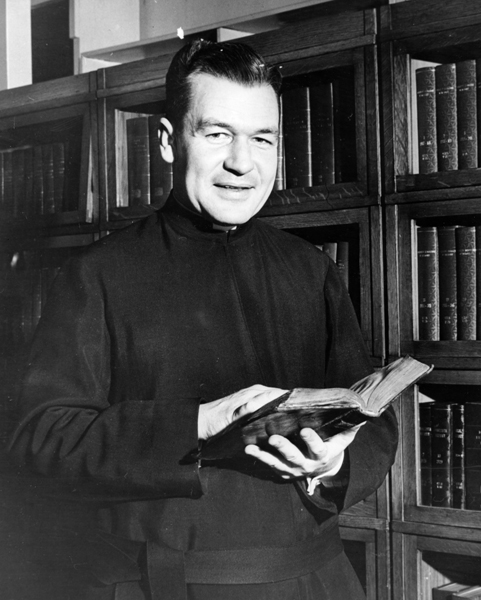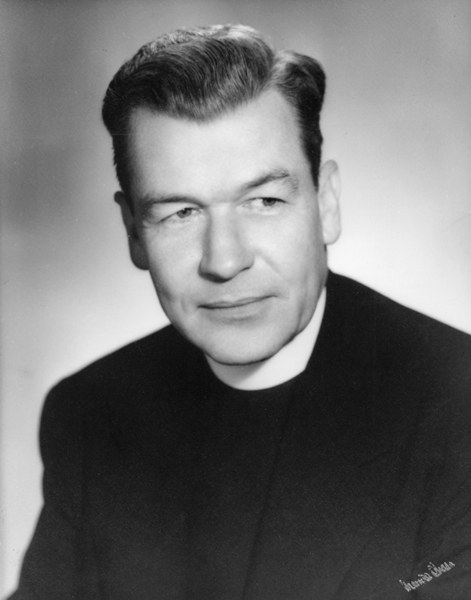St. Louis Cultural History Project—Spring 2018
Scholar, Teacher, Historian:
John Francis Bannon, S.J. (1905-1986)
by John Waide, M.A.

John Francis Jack
Bannon was born in St. Joseph, Missouri, on April 28, 1905. He was the eldest of two sons born to William Joseph and Clara Shortle Bannon. His younger brother, James Bannon, became an actor who played the role of Western hero Red Ryder on television. John Bannon was brought up in Kansas City, Missouri, where he attended Our Lady of Perpetual Help (Redemptorist) Grade School from 1910 to 1918, and Rockhurst (Jesuit) High School, graduating in 1922. Shortly after graduation, he entered the Society of Jesus at St. Stanislaus Seminary in Florissant, Missouri, and he took his first two years of philosophy studies at Florissant from 1922 to 1924. He took his first Jesuit vows at St. Stanislaus in September, 1924, while he took his collegiate studies at Saint Louis University. From 1926 to 1929 he continued his studies at Maison Saint Louis on Jersey, the Channel Islands, United Kingdom, the philosophate of the Paris Province of the Society. He received his A. B. degree from Saint Louis University in 1928, and he took another year of studies at Maison St. Louis, receiving his A. M. degree the following year.
Between 1929 and 1936, Bannon spent much of his time at St. Mary’s College in Kansas. He taught history, French, and Spanish at the St. Mary’s College High School and then at the College for a short time before the College closed in 1931. Bannon received his training in theology at St. Mary’s from 1932 to 1936. He also taught history, French, and Spanish at the Jesuit’s Regis College in Denver, Colorado. He was ordained a priest at St. Mary’s on June 23, 1935.
In the summer of 1936 he taught history at Marquette University in Milwaukee, Wisconsin. Between 1937 and 1939 he studied history and anthropology at the University of California at Berkeley, receiving his Ph. D. in 1939. His mentor was the renowned scholar of the Spanish borderlands Herbert E. Bolton, who earlier in the decade had asked Jesuit provincials in the United States to recommend graduate students for work in the treasure trove of materials documenting Jesuit missionary activities in colonial Mexico. Bannon developed a very warm and close relationship with Bolton. Bannon recalled with fondness joining in Dr. Bolton’s famous Round Table
seminars at Berkeley, and he quickly became known simply as Jack
Bannon. Bannon chose as his dissertation topic a study of the Jesuit missionary efforts in the Mexican State of Sonora before the arrival of the famous Jesuit missionary in 1687, Father Eusebio Kino. Father Bannon traveled to and visited Sonora in keeping with Bolton’s plan of combining actual field work with the study of the many archival documents at the Bancroft Library at the University of California at Berkeley.
After teaching history for the summer at the University of San Francisco, Bannon began his 34-year association as an active faculty member of the Department of History at Saint Louis University in the fall of 1939. In 1943 he was appointed chair of the department, a position he held for 28 years. He retired in 1973 as professor emeritus. Before he retired, Father Bannon served as a visiting professor of history at several schools, including Mount St. Mary’s College in California, the University of Colorado-Boulder, the University of New Mexico, and Utah State. After retirement, he spent one semester at Marquette University in 1974 and another at the University of Colorado.
Father Bannon was an internationally recognized scholar. He was the author of more than a dozen books and hundreds of articles and reviews. Two of his best-known books were his two volume History of the Americas, which was widely used as a text in many American universities, with the other being Herbert Eugene Bolton: The Historian and the Man . This later title is the definitive biography of Father Bannon’s mentor at the University of California. It was Bolton who transformed the study of the history of the Spanish borderlands in the Americas from a neglected curiosity into one of the most significant areas of historical research in the 20th century. Father Bannon came to be recognized as an authority on the early trans-Mississippi West and colonial Latin America. Like Bolton, he regarded the histories of North and South America as inseparable parts of the story of the hemisphere as a whole.

Father Bannon co-founded the Western Historical Association and served as its president from 1965 to 1966. He was on the board of editors of the Hispanic-American Historical Review, and on the executive council of the American Catholic Historical Association. He served as program chair of the Mississippi Valley Historical Society (Organization of American Historians) four times, and he hosted the St. Louis meeting in 1955. That same year he was chair of the Conference on Latin-American History of the American Historical Association. From the mid-1940s through the 1960s, Father Bannon had regularly attended the December meeting of the American Historical Association. He edited the Historical Bulletin at Saint Louis University between 1943 and 1950 and was advisory editor for Manuscripta when it appeared as a new publication of Pius XII Memorial Library at Saint Louis University.
In addition to these more traditional
scholarly accomplishments, Father Bannon became well known for his work in early educational television. In 1954, working with Station KETC, Channel 9, the first public television station in St. Louis, Father Bannon presented a series of thirty-six half-hour talks on the History of the United States.
The National Education Television and Radio Center in Ann Arbor, Michigan, picked up Father Bannon’s programs, and they appeared in twenty other cities across the United States. In 1956, Bannon created thirty more television programs on The Great American West
” which could be taken for academic credit at Saint Louis University, while in 1957, Father Bannon developed another series of programs on The Latin Americas
for telecast in St. Louis and across the country. In another testament to his versatility and his ability to reach diverse audiences, Bannon authored two in-flight booklets for travelers on American Airlines, History Below the Jet Trails and West to the River!
Just as in his classrooms, Father Bannon took advantage of a variety of visual aids for these television programs. He brought in relief maps, development maps, charts, and even magnetic blackboards to the set. This set also included a teacher’s desk, crossed halberds (spear/battle axe), a crucifix, and the coat of arms of Spain and Portugal.
Although Father Bannon was the head of a large academic department, he was certainly not fond of administrative red-tape
that interfered with the education of students. Throughout his teaching career, Father Bannon developed incredibly warm and personal relationships with all his students, in particular, with his graduate students. He insisted on assigned seats in his classrooms, not to intimidate or frighten students, but simply so he could match the students’ faces with their names! It was said that Father Bannon could remember the name of each one of his students, and he became a close friend to numerous students. Many Saint Louis University students were amazed to learn that Father Bannon had taught history to one of their parents years before!
After Father Bannon formally retired from the History Department in 1973, he did remain quite intellectually active. In addition to holding the several visiting professorships mentioned earlier, Father Bannon continued to devote a great deal of time to research and writing. A significant part of this research and writing was spent on the academic history of Saint Louis University and the history of the Missouri Province of the Society of Jesus. He produced a small booklet for each academic department in the University. These booklets contained the name and rank of each faculty member in the department and their academic biography for each year from the early 1920s until 1978. These booklets also listed the names and academic background of each graduate student in the department, as well as the title of their dissertation. In addition, these little books also contained statistics on the number of majors and graduate students in each department for every year.
Among another of his activities after retiring from teaching, Father Bannon served as “de facto” Archivist for Saint Louis University. In this capacity, Bannon collected copies of University catalogs and bulletins, yearbooks, various other University publications, photographs, and collections of academic papers of several deceased Jesuit faculty members. The materials which Father Bannon collected are constantly used by patrons and staff in the current University Archives located in Pius Library.
In 1973, Father Bannon received an honorary degree from his alma mater, Rockhurst College (University) in Kansas City, and a few years later, in 1978, Saint Louis University honored him with an Alumni Merit Award. In 1982, in conjunction with the annual meeting of the American Catholic Historical Association, a group of Father Bannon’s former graduate students arranged for a conference session in his honor. The papers from this session, served as the core of a festschrift published later that year entitled, From the Mississippi to the Pacific: Essays in Honor of John Francis Bannon.
By this time, Father Bannon’s health was failing, as he had been suffering with emphysema for some time. In 1983, an endowed fund was established in Father Bannon’s honor for the benefit of the Department of History. Soon, through the generosity of Mrs. Genevieve Genie
James, a long-time University friend and benefactor, this fund was transformed into an endowed professorship named in Father Bannon’s honor: Father John Francis Bannon, Scholar, Teacher, Priest.
Father John Francis Bannon, S. J., died on June 5, 1986, at the age of 81 in St. Louis, Missouri.
